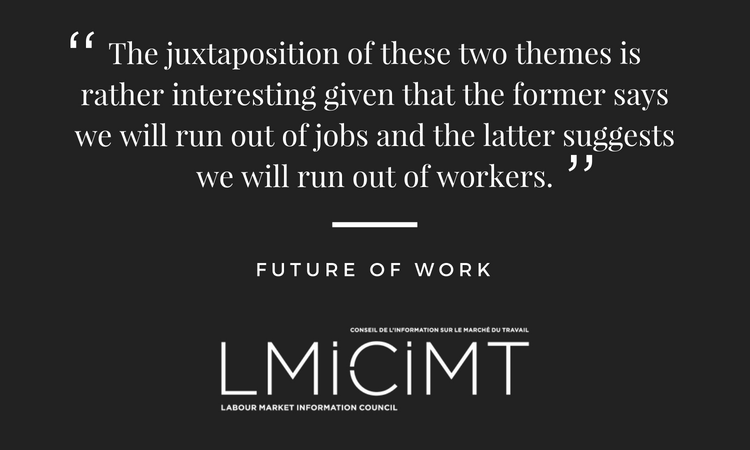
Nothing is more difficult to predict than the future
Yogi Berra was probably as good a philosopher as he was a baseball catcher, which, if you know anything about baseball, says a lot about how revered he was in terms of his “catch” phrases. One that sticks with me is “It’s tough to make predictions, especially about the future.”
Yet, no topic is seemingly more in vogue these days than the future of work and the plethora of attempts to predict what that might entail. Google “future of work” and more than 1.2 billion results appear, with the issue being of great interest to a wide range of stakeholders, perspectives, and citizens.
What does the future hold for Canada?
Before joining the Labour Market Information Council (LMIC), I was part of a small team at the International Labour Organization (ILO) that prepared the Inception Report for the Global Commission on the Future of Work, laying out the global challenges and opportunities for the world of work.
Now that I’m back in Canada, I’m trying to make more sense of what the prevailing evidence suggests about what the future of work might look like in country as diverse as Canada. To get a handle on this topic, LMIC set out to document and review the most recent reports in this area. We will include a review of selected future of work reports in our first newsletter, but all of the reports bring value to the conversation and are worth checking out.
Technology a key theme
In reviewing the most recent, relevant reports, we found that close to two-thirds of the studies focus on the impacts of artificial intelligence; about half discuss interrelations between technological change and demography. The juxtaposition of these two themes is rather interesting given that the former says we will run out of jobs and the latter suggests we will run out of workers. Key trends primarily left out of this discussion, however, include globalization and trade patterns, as well as the implications of climate change on the world of work. The focus on technology is rather surprising given the current debates at the G20, the G7, and other international fora.

More local insight needed
Only a quarter of the Canadian-focused reports include labour market forecasts at the provincial level. On top of that, no studies include local, granular labour market insights beyond the provincial or territorial level to help Canada’s policy makers, education and training providers, or business leaders make informed decisions.
For many, this is “déjà vu all over again” — another great Yogi saying. Indeed, our partners and stakeholders have long called for more granular information at the local level to support better, more informed choices about how to improve outcomes for Canadians. This is why one of the pillars of our Strategic Plan is to address the need for detailed, local information and insights on a range of labour market information issues.
To that end, LMIC is exploring with our partners innovative methods to generate better local, granular information. We will evaluate our methods against a set of open criteria to ensure we’re working towards the best possible outcomes, because “If you don’t know where you’re going, you might end up some place else.”
Learn more about where LMIC plans on going in our Strategic Plan 2018–2020 and stay up to day on the journey by joining our mailing list.


